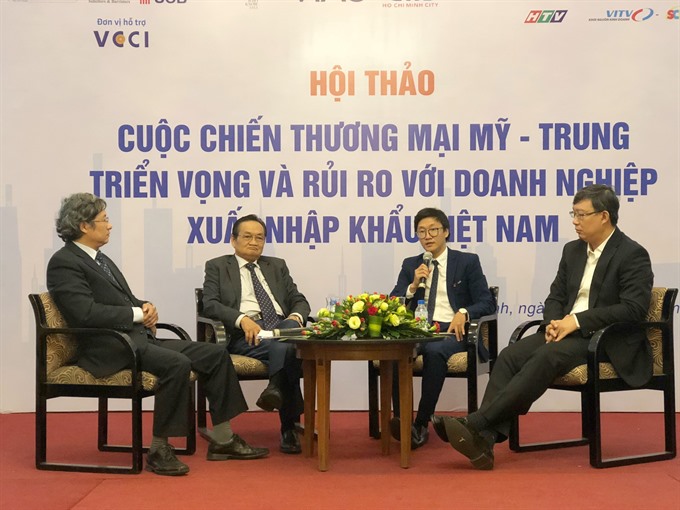With the US-China trade war escalating, Viet Nam may be able to increase exports of items like furniture, agricultural products, and leather products to the US, a conference heard in HCM City on Wednesday.

With the US-China trade war escalating, Viet Nam may be able to increase exports of items like furniture, agricultural products, and leather products to the US, a conference heard in HCM City on Wednesday.
In its most recent move, the US imposed a 10 per cent tariff on US$200 billion worth of Chinese imports. The tariff will rise to 25 per cent on January 1 next year.
In retaliation, China has decided to impose taxes on about $60 billion worth of imports from the US.
Delegates at the conference said the US tariffs on China would bring both opportunities and challenges to Viet Nam.
Nguyen Xuan Thanh, development director at Fulbright University Viet Nam, said there would be shortages when China’s exports to the US dry up, and Vietnamese firms could take advantage of this to boost exports to that country.
Firstly, exports of Chinese fisheries products are expected to reduce by $700 million, and Viet Nam can step in and fill the breach, especially in the case of shrimp, according to Thanh.
Secondly, China is the leading exporter of wood products to the US, with its exports last year exceeding $32 billion. The new tariffs are expected to reduce shipments by $7 billion, he said.
Other countries will benefit, including Viet Nam, one of the largest exporters of wooden products, especially to the US, he said.
Thirdly, China sells $7 billion worth of leather products to the US, mainly suitcases and handbags, and according to the World Bank, exports could fall by $1.9 billion, offering an opportunity to Vietnamese firms, he said.
Tran Du Lich, deputy chairman of the Viet Nam International Arbitration Centre, said: “The question is how to grasp that opportunity.”
Other countries with similar products as Viet Nam would also want to take advantage of this opportunity to boost exports to the US, he pointed out.
He said Vietnamese firms should enhance product quality and competitiveness, promote trade and take advantage of free trade agreements.
Origin transparency was critical to taking over the market share lost by China, he said.
Negative impact
Speaking about challenges, participants said Chinese manufacturers might ship half-finished products to Viet Nam for finishing and exporting to the US.
Lich said: “Vietnamese firms should stay alert and not get involved with this because the US, if it detects this, might impose taxes which would harm not only that industry but also the economy itself.”
Thanh said Viet Nam ranked fifth in the list of economies with which the US had a trade deficit with in 2017, behind only China, the EU, Mexico, and Japan.
The US had already slapped higher import tariffs on China, the EU and Mexico, while Japan was negotiating with it to ward off tariffs on cars, he said.
If the US imposed punitive tariffs, the impact on the Vietnamese economy would be greater than that on the EU, China or Mexico since Viet Nam has an “open” economy whose exports are 200 per cent of its GDP, he said.
Delegates said to mitigate the risk, authorities should closely monitor export products for origin to prevent fraud with respect to customs declarations.
Another challenge was that Chinese products previously destined for the US could now head to Southeast Asia, including Viet Nam, putting pressure on Vietnamese firms, he said.
Lich said the Government should focus on developing distribution systems since whoever dominates distribution will dominate the production system.
The trade war would lead to manufacturers relocating their production bases from China to Southeast Asia, especially Viet Nam and Indonesia, he said.
But Viet Nam had two problems in competing with Indonesia, poor transport links and high logistics costs, he said, adding that the Government should focus on completing infrastructure in certain industrial parks instead of spreading its investment too thin, resulting in inadequate infrastructure.
Besides, the investment environment needed to be further reformed to attract more investors, he said. — VNS





